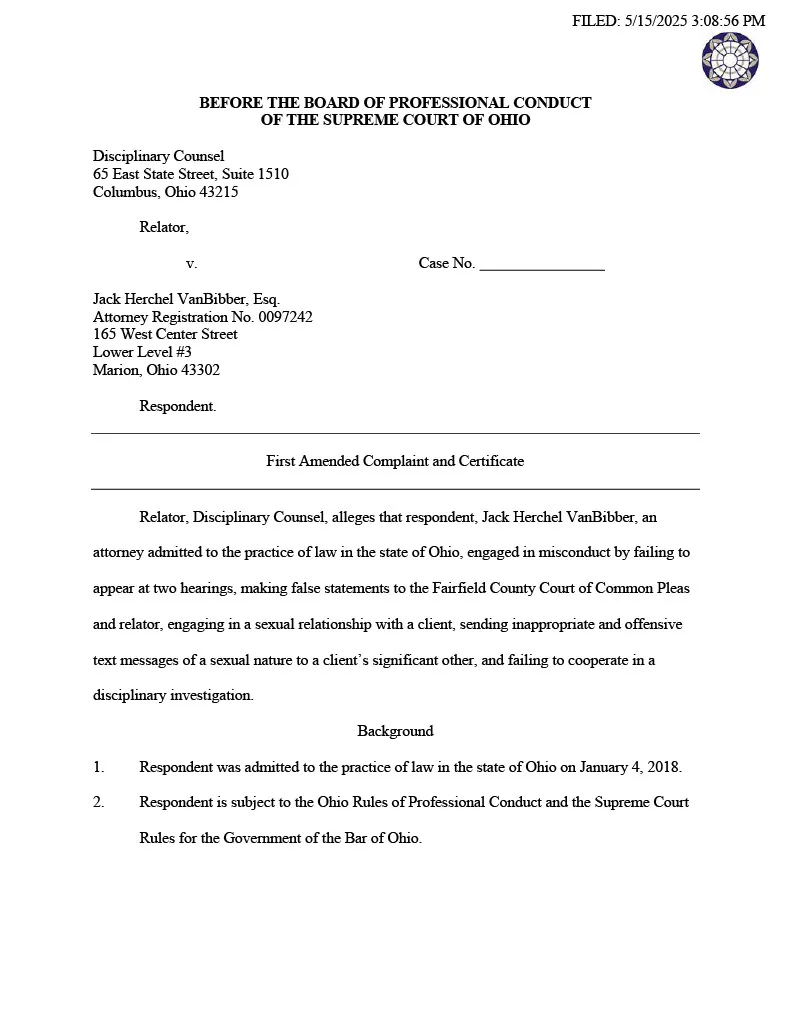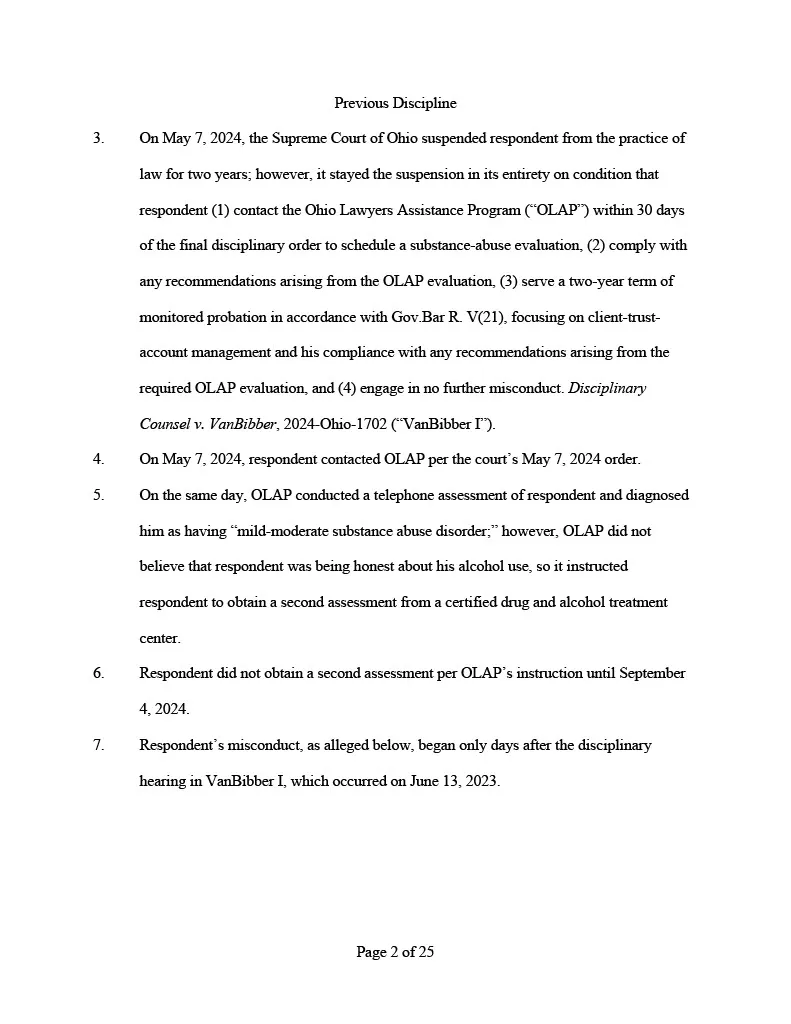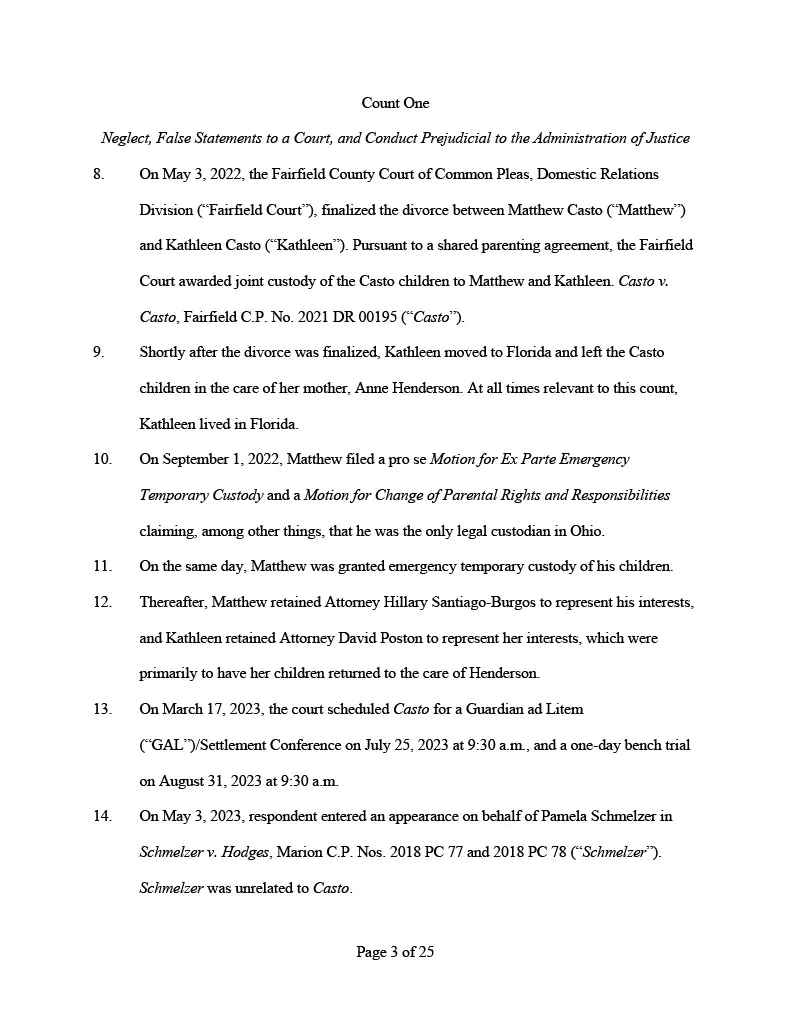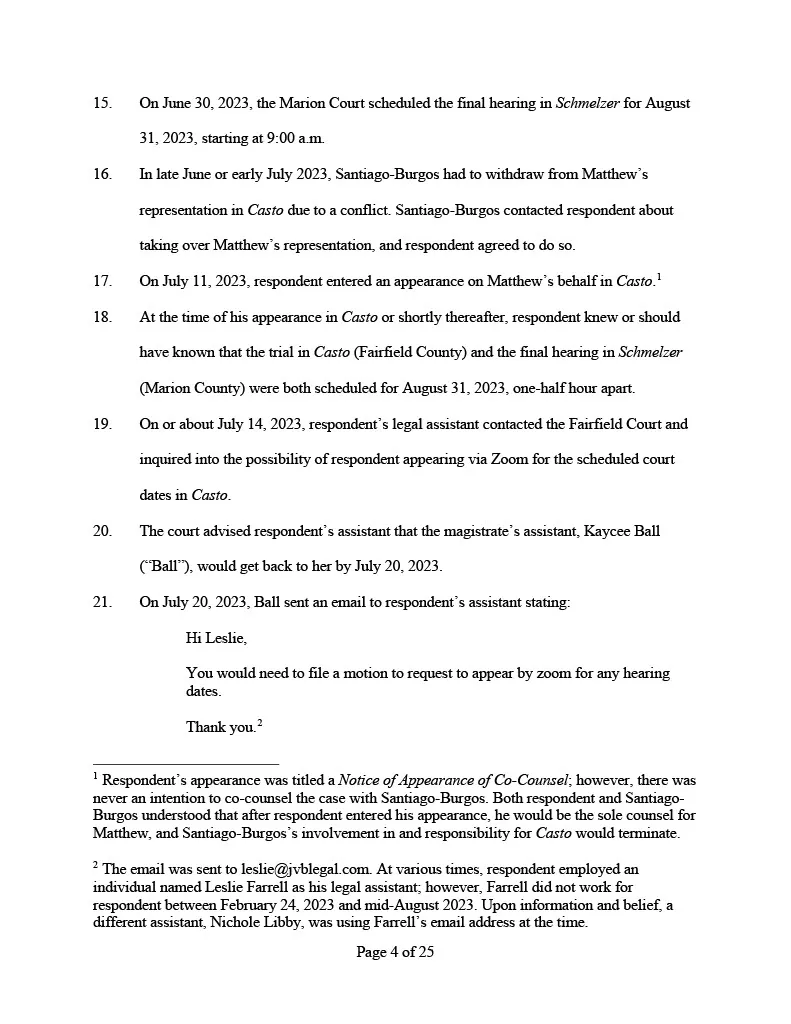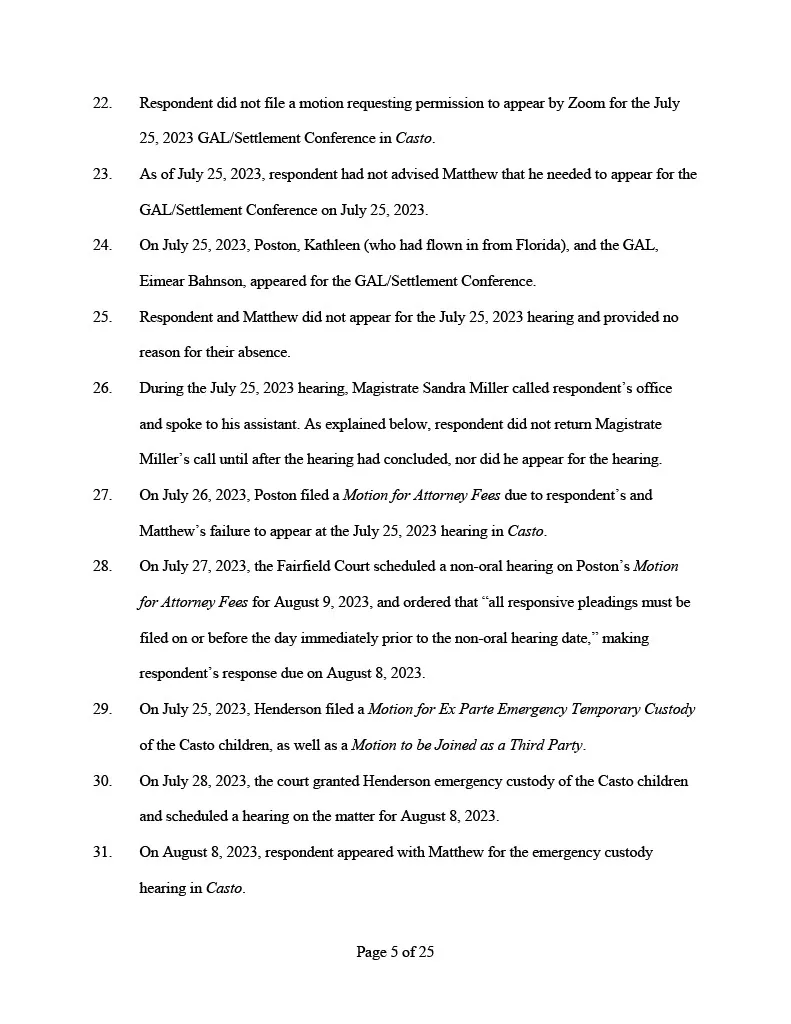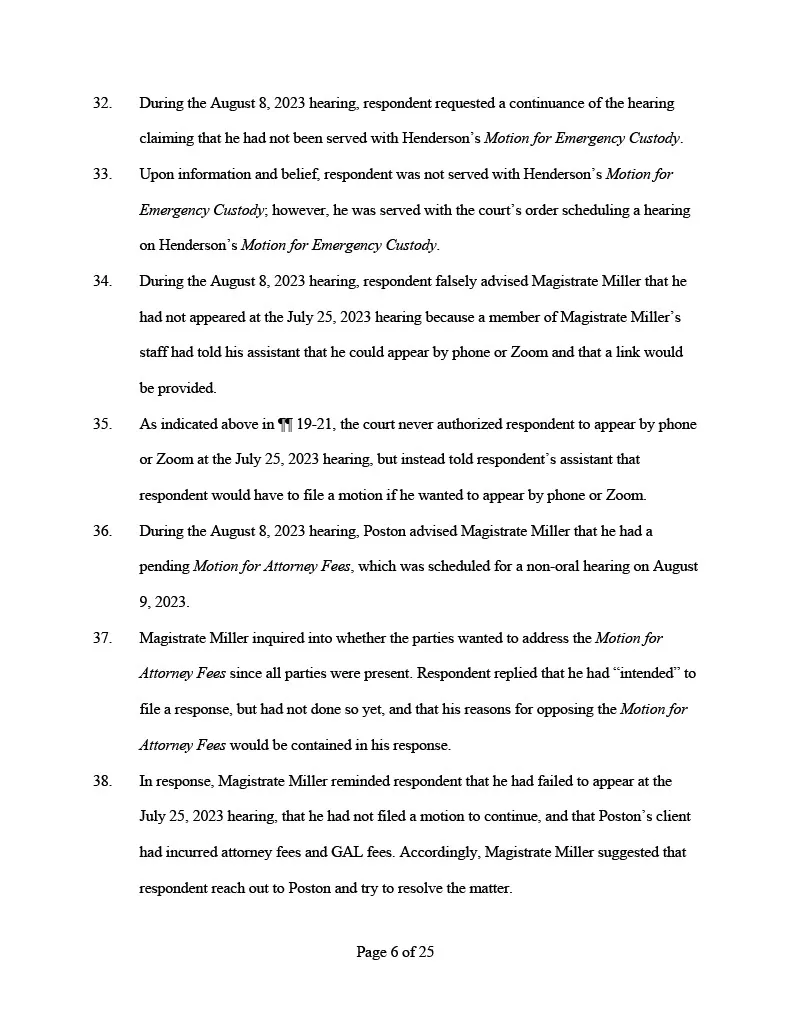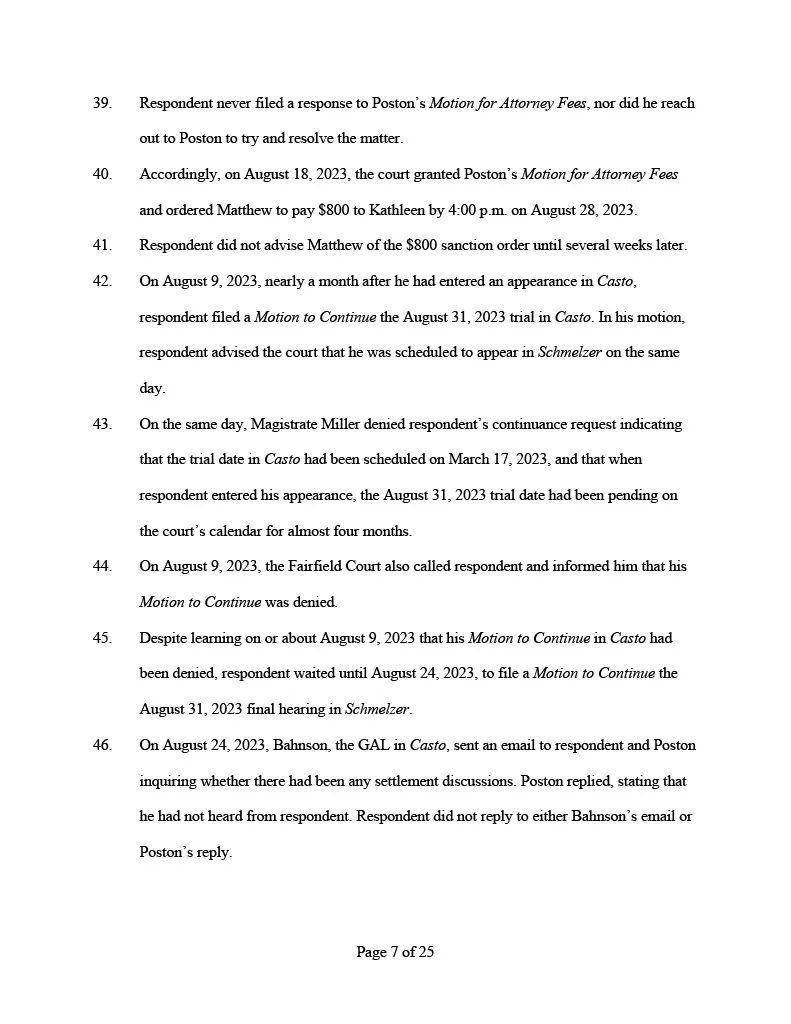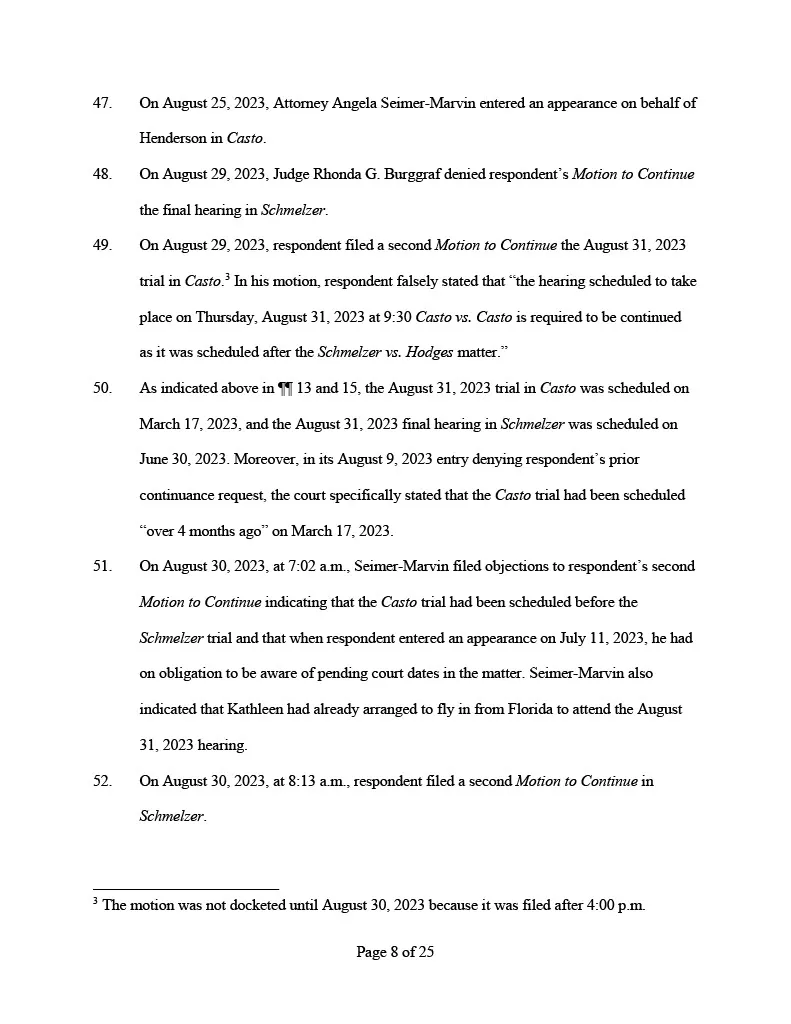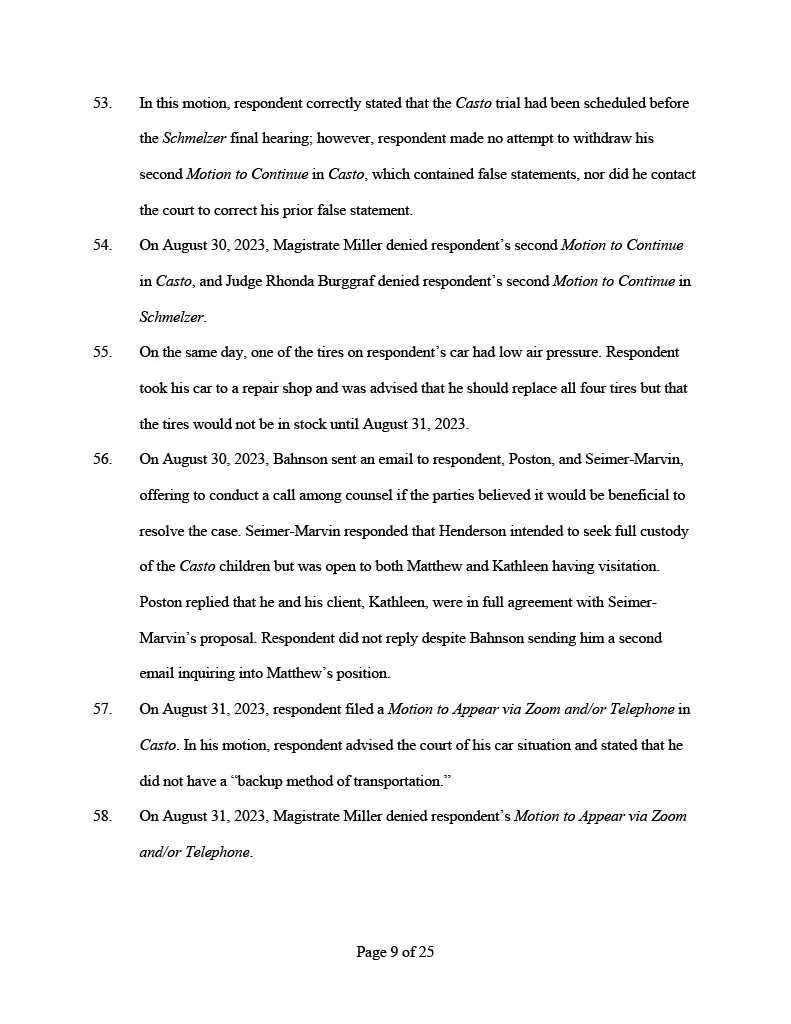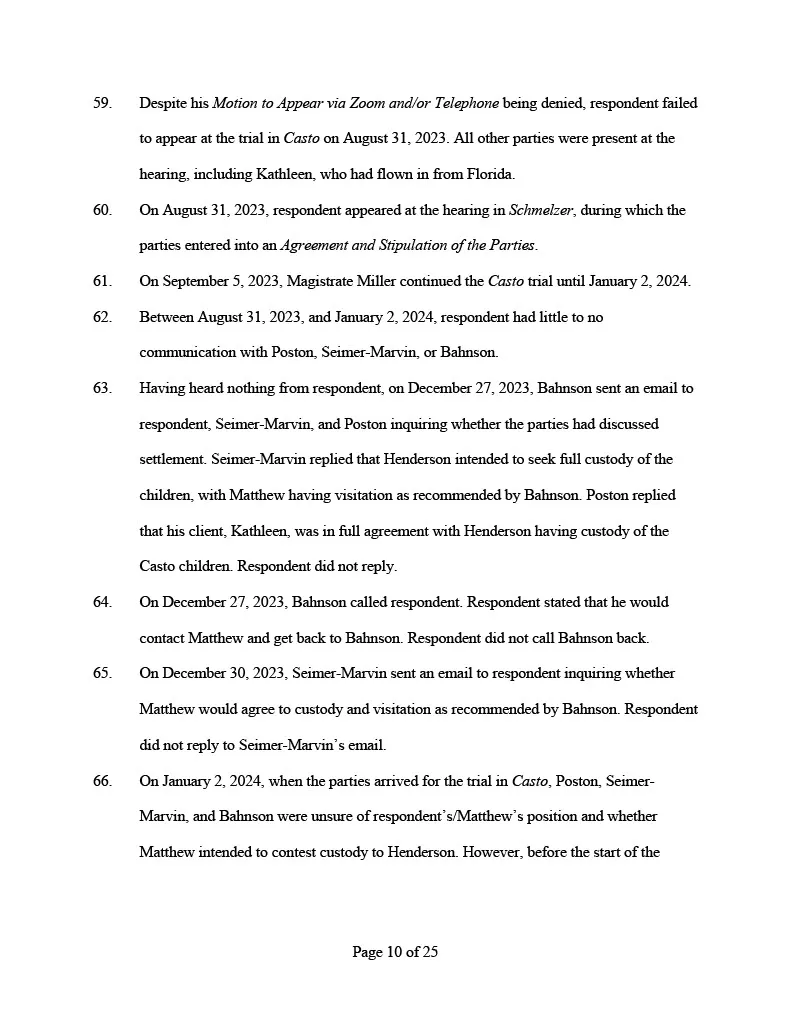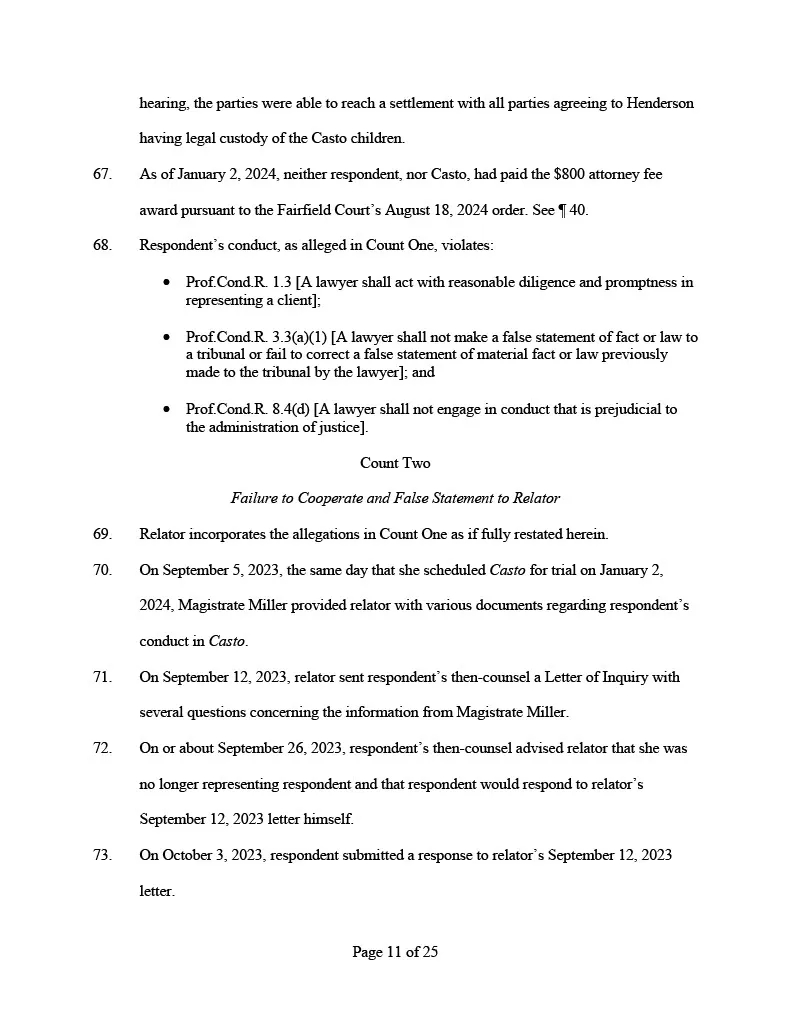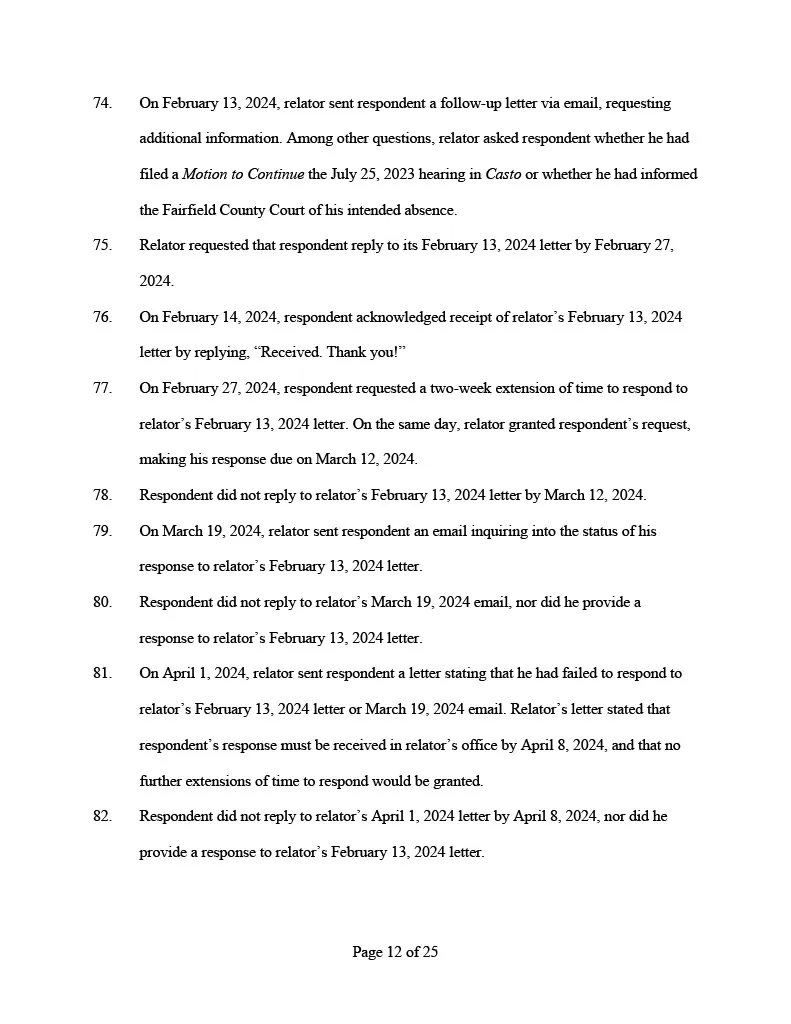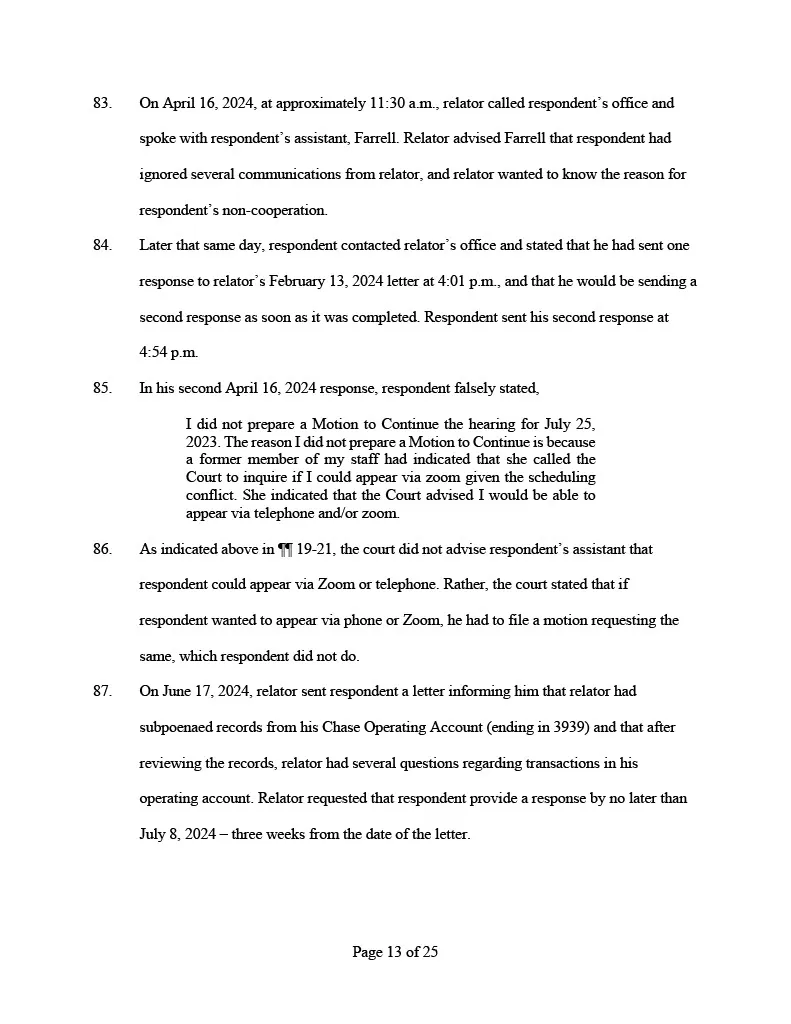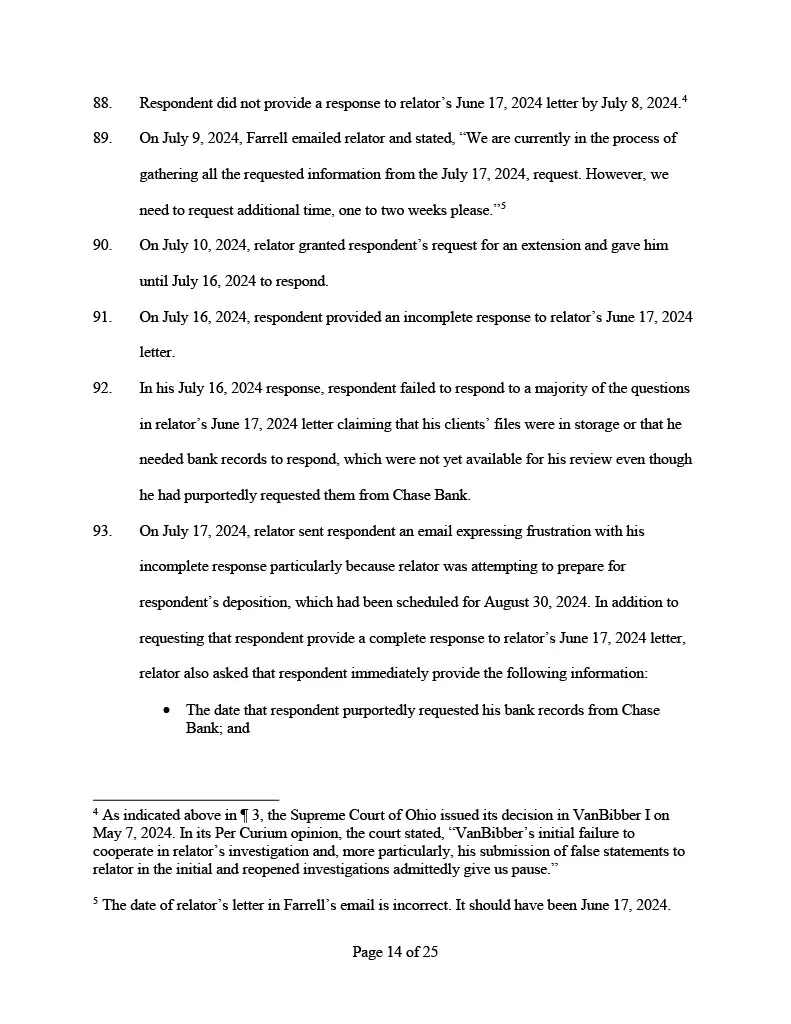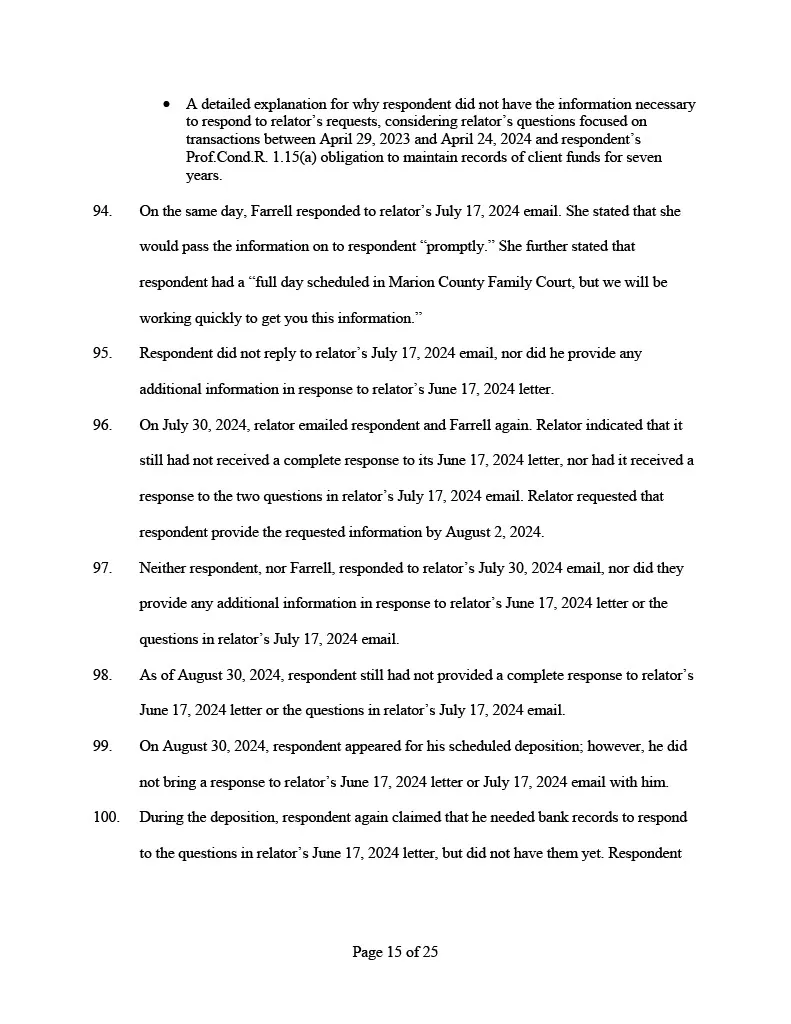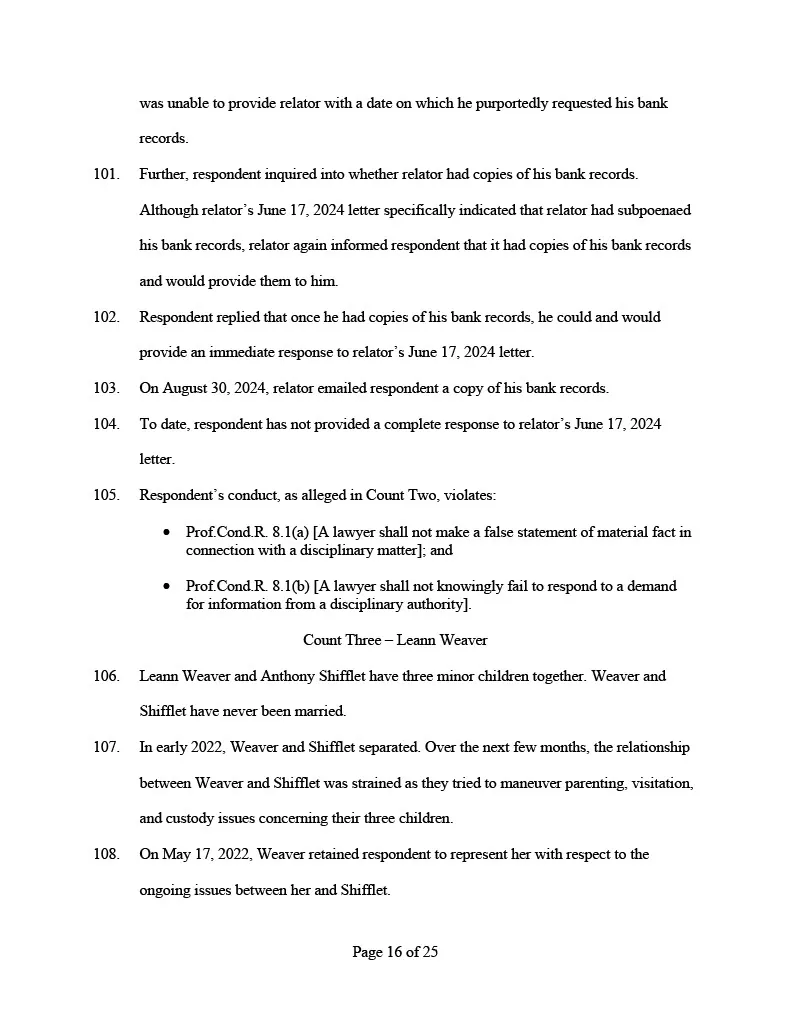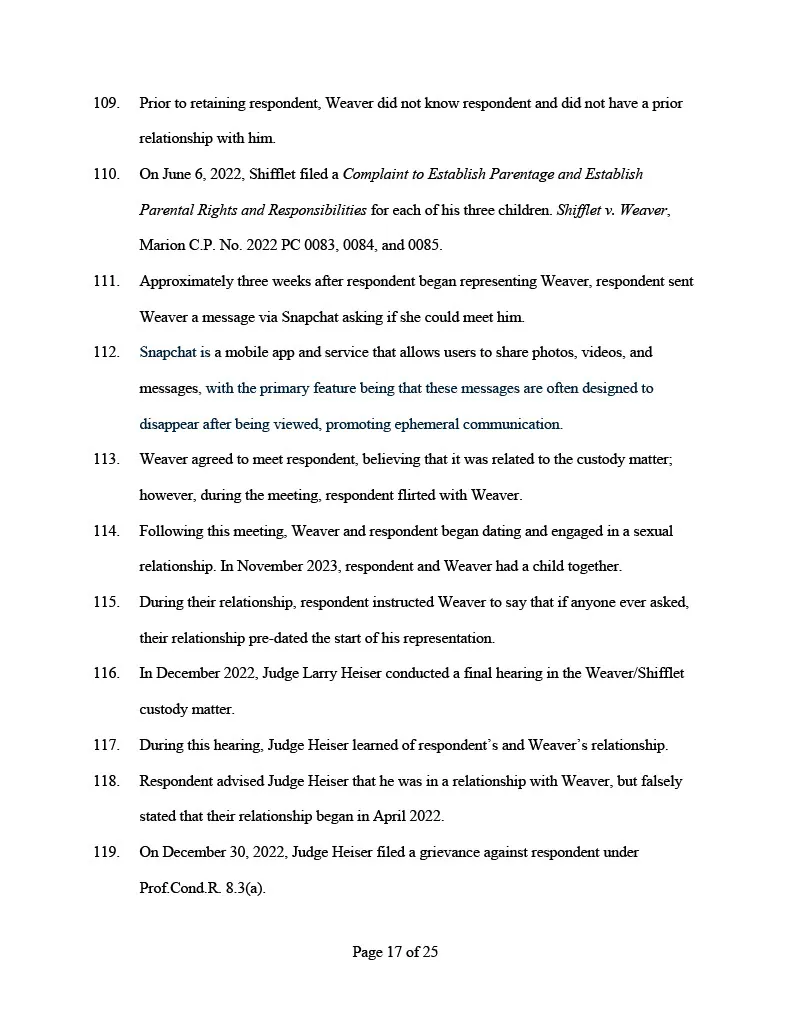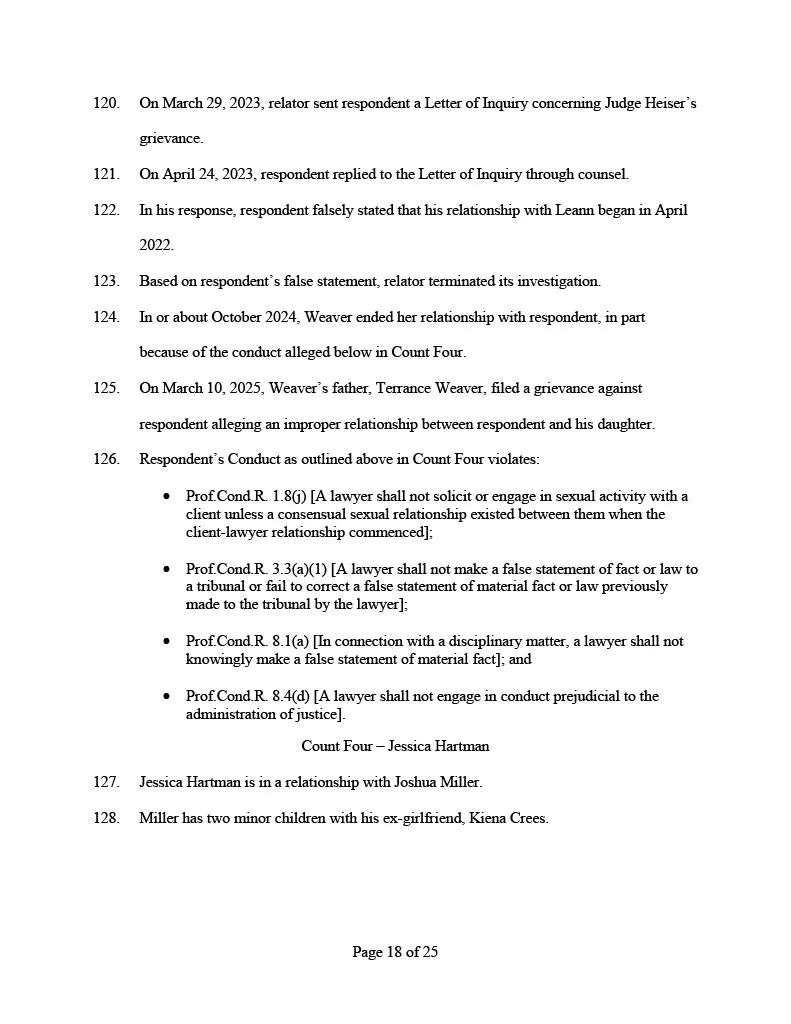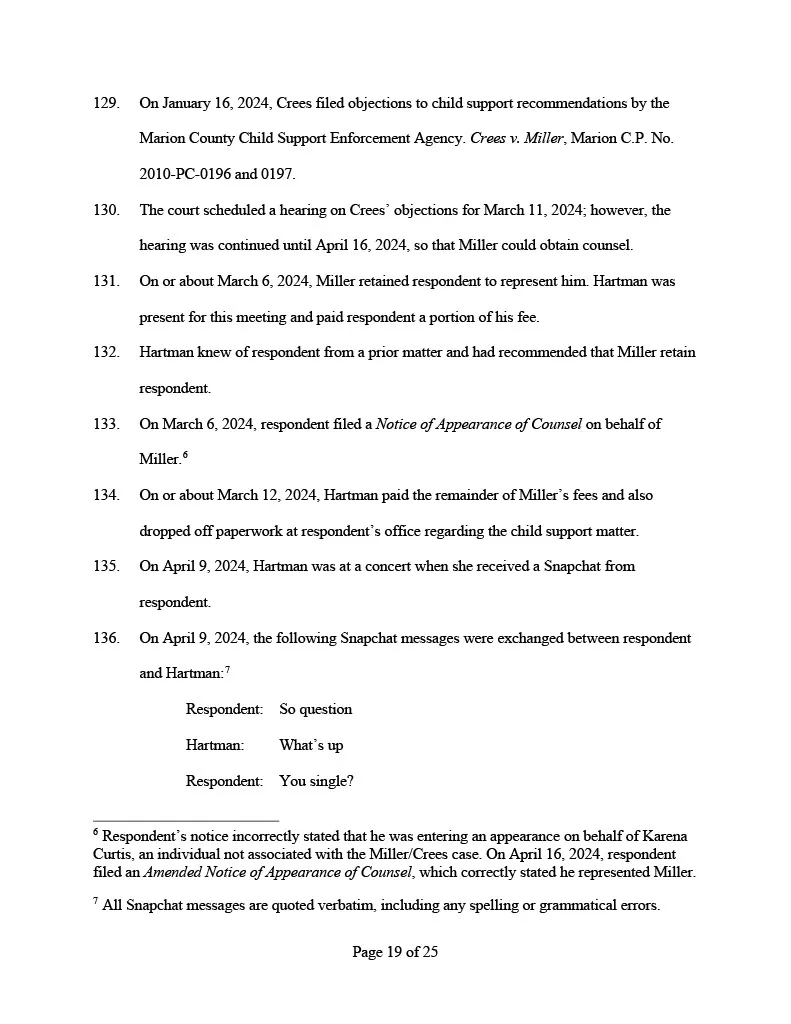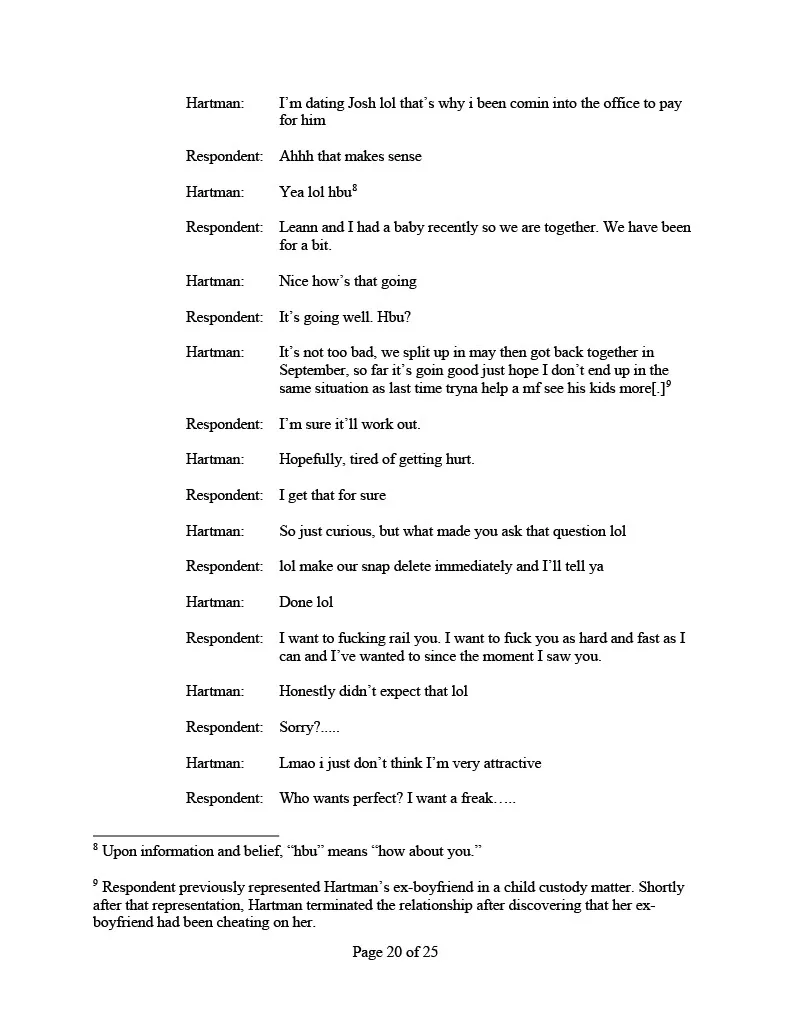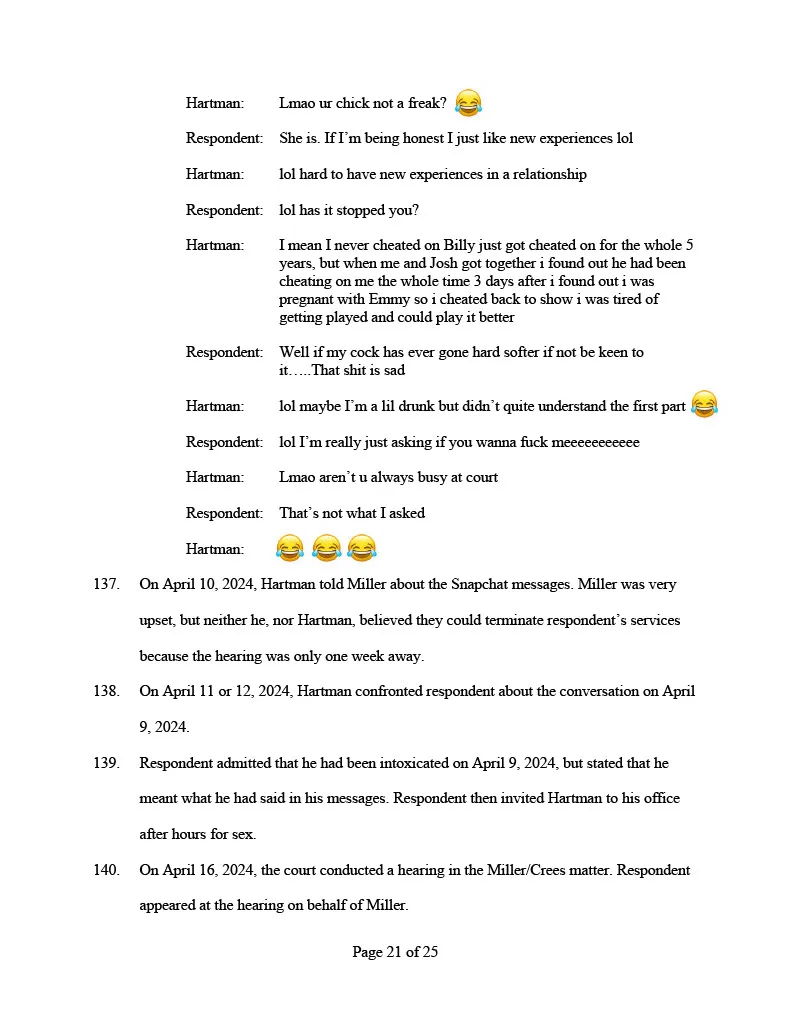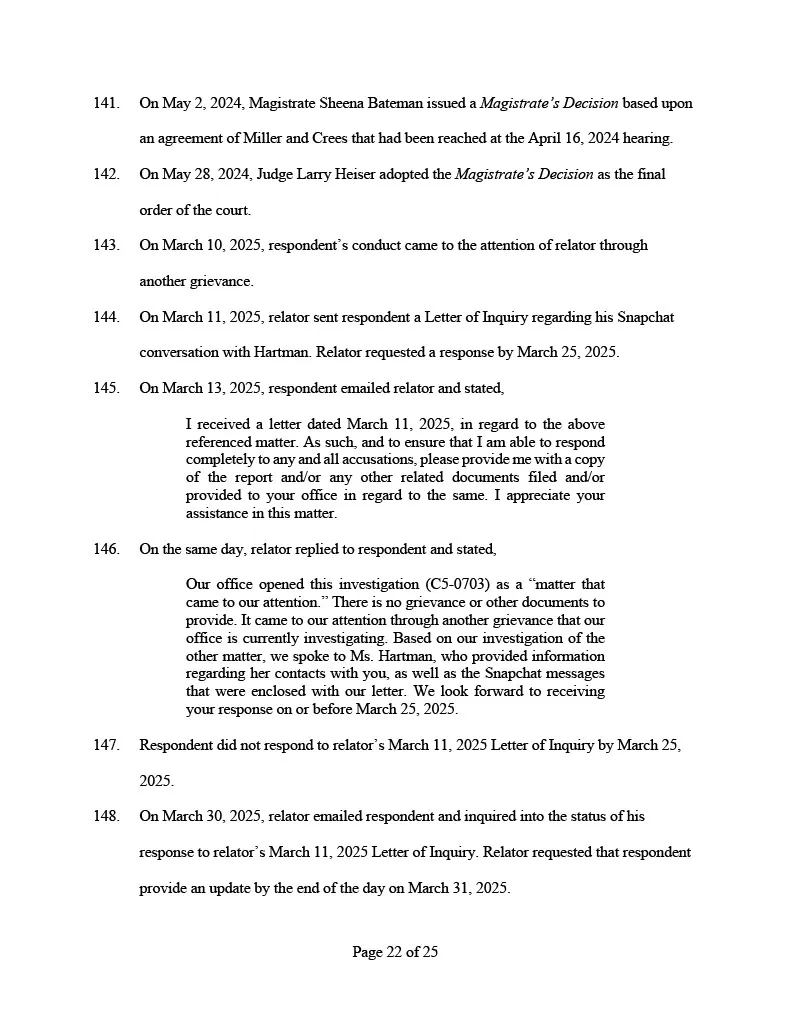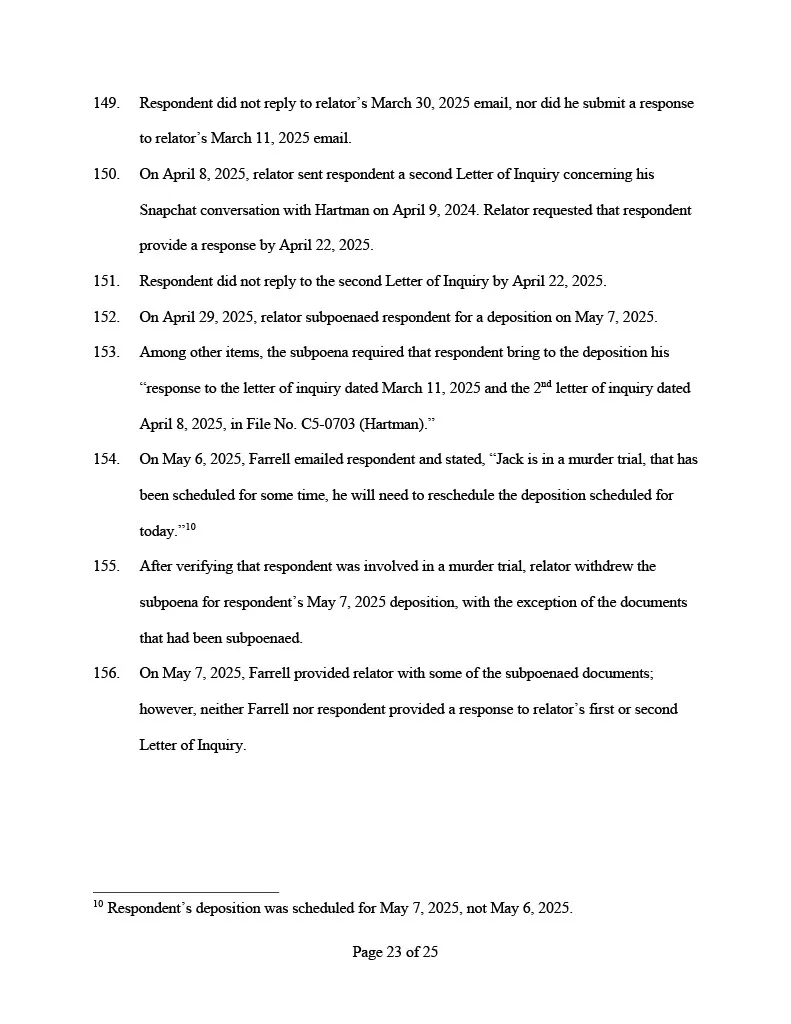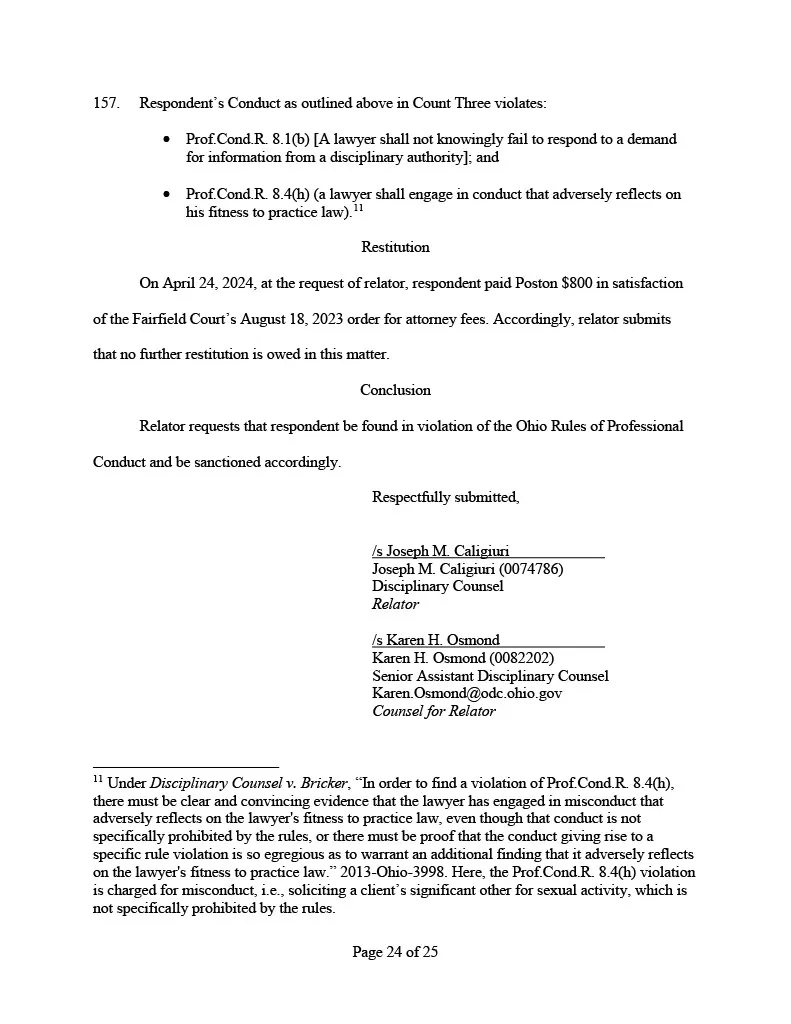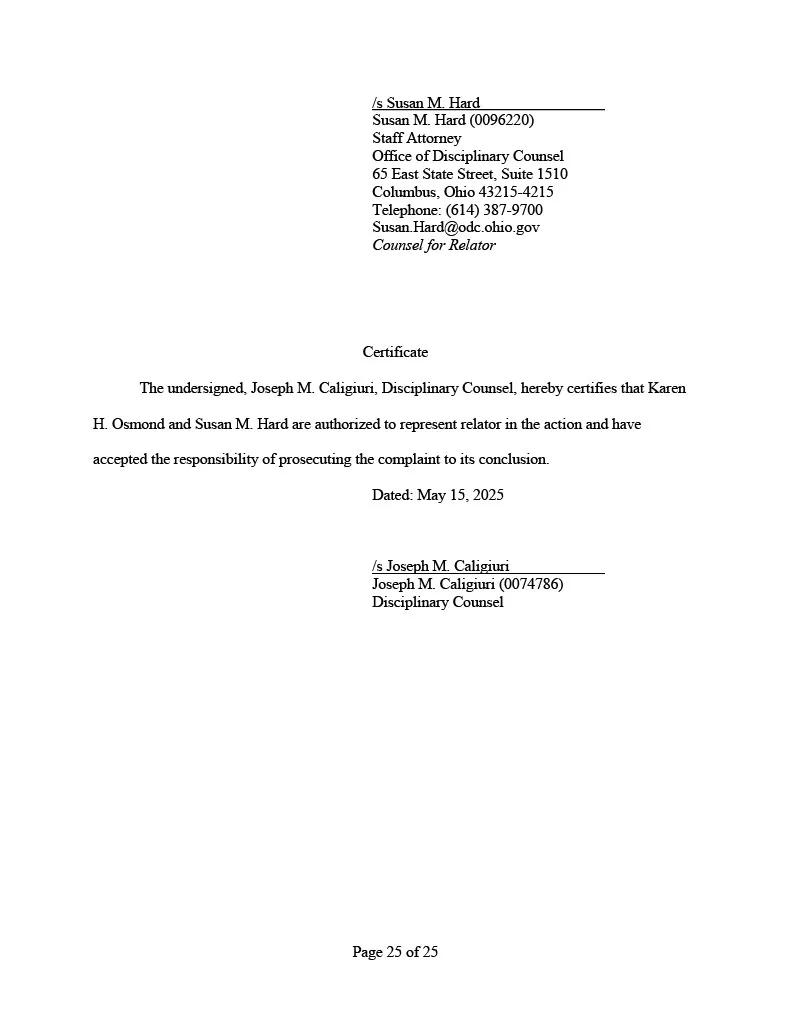
MARION, OH – Local attorney Jack Herchel VanBibber (Attorney Registration No. 0097242) is confronting a new and extensive set of misconduct allegations brought forth by the Disciplinary Counsel of the Supreme Court of Ohio, casting a significant and deeply troubling shadow over his professional standing and reputation within the Marion community. A “First Amended Complaint and Certificate,” filed on May 15, 2025, meticulously details what appears to be a pervasive and disturbing pattern of alleged professional failings. These accusations are not minor infractions; they span a range of serious concerns, including a fundamental neglect of client duties that could have severe repercussions for those he represented, the making of demonstrably false statements to courts and investigators which strikes at the heart of legal integrity, engagement in improper sexual conduct that dangerously blurs professional and personal lines, and a repeated, seemingly defiant failure to cooperate with disciplinary authorities tasked with upholding the ethical backbone of the legal profession.
These fresh accusations compound existing, serious concerns, as VanBibber was previously handed a two-year stayed suspension by the Supreme Court of Ohio on May 7, 2024. This prior disciplinary action, a significant censure in itself, was contingent on several stringent conditions, critically including an unequivocal requirement for no further misconduct. The fact that this was a “stayed” suspension meant he was given a chance to continue practicing, albeit under a cloud of scrutiny. Disturbingly, the current complaint alleges that some of the new instances of misconduct began mere days after the disciplinary hearing for his prior case in June 2023, suggesting a potential and profound disregard for the gravity of the initial sanctions and a squandering of the opportunity for professional remediation. Such proximity in timing raises alarming questions about his commitment to reform.
VanBibber, admitted to the Ohio bar on January 4, 2018, with a listed office at 165 West Center Street, Marion, Ohio, is now under an even more intense and critical level of scrutiny. The Board of Professional Conduct is preparing to review these serious charges, a process that could have career-ending implications for his ability to practice law in the state. The sheer weight and breadth of these cumulative allegations raise significant, unavoidable questions about his adherence to, and perhaps even his understanding of, the ethical and professional standards that are the bedrock of the legal profession and are rightly expected of all its practitioners.
File courtesy of Office of Disciplinary Counsel
The Supreme Court of Ohio and converted to Jpeg format for ease of publishing https://odc.ohio.gov/recentdecisions
File courtesy of Office of Disciplinary Counsel
The Supreme Court of Ohio PDF Format https://odc.ohio.gov/recentdecisions
Previous Discipline and OLAP Involvement: A Troubled History Under Scrutiny
The May 2024 disciplinary order, a serious censure in itself, explicitly required VanBibber to contact the Ohio Lawyers Assistance Program (OLAP), an organization specifically designed to help legal professionals struggling with personal issues like substance abuse that can impair their judgment and performance. An OLAP assessment conducted on May 7, 2024, resulted in a diagnosis of “mild-moderate substance abuse disorder.” This clinical finding alone should have served as a significant wake-up call, signaling an urgent need for immediate, thorough, and sincere engagement with recommended support systems and treatment. However, the complaint chillingly indicates that OLAP officials reportedly harbored serious doubts about VanBibber’s honesty and candor regarding his alcohol consumption, a crucial element in addressing any substance-related disorder. Consequently, due to these concerns about his truthfulness, they mandated a second, more comprehensive assessment from a certified drug and alcohol treatment center. According to the complaint, this crucial second assessment was not obtained until September 4, 2024—a delay of nearly four months. This significant and unexplained lag could easily be interpreted as a profound reluctance, or even an unwillingness, to fully and honestly address the serious issues identified by OLAP, further complicating his already tenuous probationary terms and casting doubt on his commitment to the conditions of his stayed suspension.
Count One: Neglect, False Statements to Court, and Conduct Prejudicial to Justice in the Casto Case
The first count of the complaint centers on VanBibber’s handling of the Casto v. Casto divorce and custody case in Fairfield County, painting a deeply concerning picture of alleged professional dereliction, client neglect, and outright deception directed at the court. The detailed allegations suggest a cavalier approach to his responsibilities, with potentially devastating consequences for the family involved. Key allegations include:
- Failure to Appear (July 25, 2023): VanBibber and his client, Matthew Casto, allegedly failed to appear for a critically important scheduled Guardian ad Litem (GAL)/Settlement Conference. Such conferences are pivotal moments in emotionally charged custody disputes, specifically designed to facilitate resolutions in the best interests of the children involved, often sparing them further turmoil. Their unexplained absence left opposing counsel (who had a client fly in from Florida), the GAL, and the court waiting, wasting valuable judicial resources and, more importantly, potentially delaying justice and prolonging uncertainty for the families involved. This non-appearance can also unfairly prejudice a client’s case.
- False Statements to Magistrate: During a subsequent hearing on August 8, 2023, convened in part to address the prior non-appearance, VanBibber allegedly compounded the initial failure by falsely telling Magistrate Sandra Miller that a member of her staff had verbally permitted him to appear by phone or Zoom for the July 25 hearing. The complaint asserts, with supporting detail from court communications, that the court had actually informed VanBibber’s assistant that a formal written motion was required for any such remote appearance—a standard and straightforward procedural step that was never taken. This alleged misrepresentation to a judicial officer is not a minor oversight; it is a serious breach of an attorney’s fundamental duty of candor to the tribunal, an ethical cornerstone.
- Scheduling Conflicts and Further Falsehoods: The complaint further alleges that VanBibber knew or should have known of a direct scheduling conflict between the Casto trial in Fairfield County and a final hearing in an unrelated Marion County case, Schmelzer v. Hodges, both set for August 31, 2023. Diligently managing one’s professional calendar to avoid such conflicts is a basic tenet of competent legal practice, essential for ensuring adequate preparation and zealous representation for all clients.
- After his initial motion to continue the Casto trial was denied (with the court pointedly noting the Casto trial date had been established for nearly four months prior to his entry of appearance in the case, implying ample time to address conflicts), VanBibber filed a second motion. In this second attempt to secure a continuance, he allegedly falsely stated that the Casto hearing was scheduled after the Schmelzer matter. The complaint meticulously highlights the factual discrepancy: the Casto trial was scheduled on March 17, 2023, while the Schmelzer hearing was set much later, on June 30, 2023. Such a blatant misstatement of scheduling facts, if proven, could be viewed as a deliberate attempt to mislead the court simply to resolve his own scheduling dilemma, at the expense of truth and judicial efficiency.
- Failure to Appear (August 31, 2023): Despite his motion to appear via Zoom or telephone being denied due to a reported car issue (a flat tire, which he claimed left him with no “backup method of transportation”), VanBibber still failed to appear for the Casto trial in Fairfield County. All other parties, including his client’s ex-wife who had again incurred the expense and effort to fly in from Florida, were present and prepared to proceed. Strikingly, and in stark contrast, he did manage to attend the Schmelzer hearing in Marion on the very same day. This disparity in attendance inevitably raises serious questions about his prioritization of cases, his respect for the Fairfield County court’s orders, and the efforts he was genuinely willing to make to meet his professional obligations.
- Client Sanctioned Due to Attorney’s Actions: As a direct and foreseeable consequence of the missed July 25 hearing, VanBibber’s client, Matthew Casto, was ordered by the court to pay $800 in attorney fees to the opposing party—a financial penalty stemming directly from his counsel’s alleged non-appearance. The complaint further alleges that VanBibber failed to inform his client of this financial sanction for several weeks, leaving the client not only to bear the cost but also to remain unaware of a debt incurred due to his own lawyer’s alleged failings. This sum was eventually paid by VanBibber himself in April 2024, but, critically, only at the Relator’s explicit request, long after the financial burden and potential stress had been imposed on his client.
- Pervasive Lack of Communication: Beyond these specific, glaring incidents, the complaint also alleges a significant and detrimental lack of communication from VanBibber with opposing counsel and the GAL in the Casto case over an extended period spanning August 2023 to January 2024. Effective, timely, and professional communication is absolutely vital for the efficient progression of legal matters. Its absence, as alleged here, can stall cases, prevent meaningful settlement discussions, increase costs for all parties involved, and generally frustrate the administration of justice.
This distressing pattern of conduct in just one case, if proven, would constitute clear and multiple violations of several core professional conduct rules, including those mandating diligence and promptness in representation, truthfulness to a tribunal, and refraining from actions prejudicial to the administration of justice. The cumulative effect of these alleged actions suggests a serious disregard for judicial process, client welfare, and the basic responsibilities of an attorney.
Count Two: Failure to Cooperate and False Statement to Relator – A Pattern of Defiance and Evasion
Stemming from Magistrate Miller’s deeply concerned report on his conduct in the Casto case, the Disciplinary Counsel (Relator) initiated an investigation into VanBibber’s actions—a standard procedure when judicial officers flag potential attorney misconduct. Count Two of the complaint details what appears to be a disturbing and consistent pattern of non-cooperation and outright falsehood directed at the very body charged with overseeing attorney conduct and upholding the standards of the profession in Ohio:
- Systematic Non-Cooperation: VanBibber repeatedly failed to provide timely or complete responses to the Relator’s legitimate inquiries, a fundamental obligation for any attorney under investigation. This alleged stonewalling was not a one-off oversight; it included ignoring a February 13, 2024, letter (even after specifically requesting and receiving an extension to respond, suggesting he was aware of the deadline), a follow-up March 19, 2024, email, and a subsequent April 1, 2024, letter that unequivocally and formally demanded a response. Such a persistent pattern of non-responsiveness strongly suggests a deliberate attempt to obstruct, delay, or otherwise frustrate the disciplinary process.
- False Statement to Relator: When a response was finally, and belatedly, provided on April 16, 2024, VanBibber allegedly falsely reiterated his claim that his failure to file a motion to continue the July 25, 2023, Casto hearing was because his staff had been told he could appear via Zoom or telephone. This statement directly contradicts the court’s documented communication (which stated a motion was required) and mirrors the alleged falsehood told directly to Magistrate Miller. This indicates a troubling persistence in a narrative that appears to be factually unsupported, even when facing disciplinary inquiry.
- Further Non-Cooperation Regarding Financial Records: The alleged lack of cooperation extended significantly to inquiries about subpoenaed bank records—records essential for investigating potential mishandling of client funds or other financial improprieties. Regarding a June 17, 2024, letter from the Relator concerning these records, VanBibber allegedly failed to provide a timely or complete response. He reportedly offered explanations such as client files being in storage or that he needed bank records he hadn’t yet received from Chase Bank. This explanation is problematic on its face, given attorneys’ stringent professional obligations under Prof.Cond.R. 1.15(a) to maintain detailed, accurate, and accessible client and financial records for a period of seven years. The inability to promptly produce such records is a serious concern. Even after being provided copies of his own bank records by the Relator on August 30, 2024 (an act of assistance by the investigating body), a complete and satisfactory response was allegedly still not provided by VanBibber.
These actions, if substantiated, would potentially violate crucial rules against making false statements of material fact in connection with a disciplinary matter and knowingly failing to respond to a lawful demand for information from a disciplinary authority. An attorney’s duty to cooperate fully and honestly with such investigations is paramount to the integrity and effectiveness of the self-regulating nature of the legal profession. Failure to do so is viewed as a serious affront to the system.
Count Three: Improper Relationship with Client Leann Weaver and False Statements – A Profound Breach of Trust and Truth
This count delves into deeply personal and ethically fraught territory, detailing an alleged improper sexual relationship with a client, Leann Weaver, and subsequent, calculated false statements apparently designed to conceal the true nature and ethically problematic timing of this relationship:
- Relationship Commencement During Active Representation: Leann Weaver retained VanBibber in May 2022 to represent her in a sensitive and likely emotionally charged custody matter. The complaint alleges that approximately three weeks after this professional engagement began—a point at which his fiduciary duties to her were firmly established—VanBibber initiated personal contact with Weaver via Snapchat, a platform known for its ephemeral messaging. This contact allegedly escalated quickly into a dating and sexual relationship, all while he was actively representing her legal interests in an ongoing case. The inherent power imbalance in an attorney-client relationship makes such concurrent relationships highly problematic and ripe for potential exploitation, as the client’s emotional vulnerability and dependence on the attorney for legal outcomes can be compromised. The two subsequently had a child together in November 2023, further complicating the personal and professional entanglement.
- Instructions to Mislead and Obfuscate: The complaint further alleges a particularly calculating act: that VanBibber instructed Weaver to misrepresent the timeline of their relationship if anyone ever asked. Specifically, he allegedly told her to say their relationship predated the start of his legal representation. This alleged instruction suggests not only an awareness of the ethical impropriety of initiating a relationship with a current client but also a premeditated attempt to preemptively cover it up and deceive any future inquiries.
- False Statements to a Judge and Disciplinary Counsel:
- In December 2022, during court proceedings related to Weaver’s custody case, VanBibber allegedly falsely told Judge Larry Heiser that his relationship with Weaver began in April 2022. This specific date (April 2022) would have conveniently placed the start of their personal relationship before she officially became his client in May 2022, thereby attempting to frame the relationship as permissible under ethical rules that allow for representation if a consensual sexual relationship pre-existed.
- This alleged falsehood was then repeated, according to the complaint, in an April 2023 response to the Relator. At that time, the Relator was investigating Judge Heiser’s grievance about the relationship. VanBibber, responding through his own counsel, again allegedly falsely stated the relationship began in April 2022. This misrepresentation, the complaint states, had a direct impact, leading to the initial disciplinary investigation being prematurely and improperly terminated based on false information.
- New Grievance Revives Investigation: The truth, however, often finds a way to surface. Weaver reportedly ended her relationship with VanBibber in October 2024. Subsequently, her father, Terrance Weaver, filed a new grievance against VanBibber in March 2025. This new complaint brought the alleged true timeline and nature of the relationship back to the Disciplinary Counsel’s attention, leading to the reopening of this critical line of inquiry and the current, more detailed charges.
This alleged conduct, if proven, would represent serious violations of fundamental professional ethics, specifically Prof.Cond.R. 1.8(j). This rule unequivocally prohibits a lawyer from soliciting or engaging in sexual activity with a client unless a consensual sexual relationship existed between them before the client-lawyer relationship commenced. The rule is in place to protect clients from potential undue influence and exploitation. Additionally, the alleged false statements made to Judge Heiser and subsequently to the Relator constitute grave violations of rules requiring absolute truthfulness to a tribunal and complete honesty in disciplinary matters. Such actions not only breach trust but actively undermine the integrity of legal proceedings and the entire disciplinary process itself.
Count Four: Inappropriate Conduct with Client’s Significant Other (Jessica Hartman) and Failure to Cooperate – A Disturbing Lack of Judgment and Respect
The final count detailed in the complaint involves alleged grossly inappropriate and sexually explicit messages sent to Jessica Hartman, the significant other of another client, Joshua Miller. This is coupled with what the Disciplinary Counsel portrays as a now-familiar pattern of non-cooperation with the ensuing investigation, suggesting a consistent disregard for accountability:
- Grossly Inappropriate Snapchat Messages: On April 9, 2024, a mere few weeks after Joshua Miller retained VanBibber for a child support matter (a meeting at which Hartman was not only present but also paid a portion of VanBibber’s fee, establishing her connection to the professional engagement), VanBibber allegedly sent Hartman a series of unsolicited, unprofessional, and shockingly sexually explicit messages via Snapchat. The complaint quotes messages that are crude and predatory, such as, “I want to fucking rail you. I want to fuck you as hard and fast as I can and I’ve wanted to since the moment I saw you.” Such language from an attorney, particularly directed towards his client’s partner with whom he had professional interactions, is deeply inappropriate. It demonstrates a profound lack of professional judgment, a complete disregard for appropriate boundaries, and a potential abuse of the access his professional role provided.
- Admission and Further Inappropriate Invitation: When Hartman, understandably disturbed, confronted VanBibber about these shocking messages, he allegedly admitted to being intoxicated at the time he sent them—an excuse often used but rarely sufficient to mitigate such behavior. However, rather than offering an unequivocal and sincere apology and ceasing such conduct immediately, he reportedly stated that he “meant what he had said” in his messages, essentially reaffirming his offensive desires. He then allegedly compounded the misconduct by inviting Hartman to his office after hours for a sexual encounter. This sequence suggests not merely an isolated lapse in judgment potentially fueled by intoxication, but a more disturbing underlying attitude and a continued pattern of predatory and unprofessional behavior.
- Consistent Failure to Cooperate with Investigation: When this egregious conduct came to the attention of the Relator, VanBibber allegedly once again failed to cooperate with the investigation. He reportedly did not respond to the Relator’s Letters of Inquiry dated March 11, 2025, and a second letter dated April 8, 2025, both concerning the Hartman matter. Despite a subpoena being issued for a deposition and related documents—formal legal demands for information—the required responses to these inquiries were reportedly not provided. This continues the theme of alleged obstruction and a refusal to engage with the disciplinary process.
These actions are charged as violations of Prof.Cond.R. 8.1(b) [knowingly failing to respond to a demand for information from a disciplinary authority] and the broader, more encompassing Prof.Cond.R. 8.4(h) [engaging in conduct that adversely reflects on his fitness to practice law]. This latter rule is often invoked when an attorney’s conduct, even if not specifically itemized as a violation of another rule, is so egregious, so contrary to the character and standards expected of a lawyer, that it calls into question their basic fitness and suitability to remain a member of the bar. Soliciting a client’s significant other for sexual activity, especially using explicit and demeaning language, clearly falls into this category of behavior that erodes public trust and demeans the legal profession.
A Pattern of Concern: Far More Than Isolated Incidents, A Portrait of Unfitness
Viewed collectively, the numerous and varied allegations detailed in the First Amended Complaint, spanning multiple client cases and repeated interactions with judicial and disciplinary authorities, paint an extremely troubling and deeply concerning picture. This is not a narrative of isolated mistakes, unintentional oversights, or minor lapses in judgment that might befall any busy practitioner. Instead, the recurring themes emerging with stark clarity from the complaint include a potential systemic disregard for fundamental court procedures, rules, and deadlines; a disturbing and persistent lack of candor, extending to alleged outright falsehoods told directly to judicial officers and disciplinary investigators; an apparent pattern of neglect of client responsibilities and essential communication, potentially harming those he was sworn to represent; deeply inappropriate and unethical personal conduct directly and inexorably linked to his professional role, including alleged predatory sexual relationships and solicitations; and a consistent, pervasive, and seemingly defiant failure to cooperate with legitimate investigations into his behavior. Such a multifaceted and deeply ingrained pattern of alleged misconduct raises profound and urgent concerns about Mr. VanBibber’s respect for the rule of law, his understanding of his ethical obligations, and his fundamental fitness to continue practicing law.
What Lies Ahead: Intensified Scrutiny and Potentially Severe Consequences
The Board of Professional Conduct will now undertake a thorough and no doubt meticulous review of these extensive and extremely serious allegations. This is not a preliminary inquiry; it is a formal complaint that demands a rigorous examination of the evidence. If the Board determines there is probable cause to believe that misconduct occurred as described in the complaint—a threshold that the detailed nature of the allegations suggests may well be met—the matter will likely proceed to a formal hearing before a panel composed of attorneys and public members. This panel would then hear evidence from both the Disciplinary Counsel and Mr. VanBibber (should he choose to present a defense), cross-examine witnesses, consider legal arguments, and ultimately make findings of fact and recommendations for discipline to the Supreme Court of Ohio.
Depending on these findings, the potential sanctions for attorneys found in violation of the Ohio Rules of Professional Conduct are significant and varied, designed to protect the public, the courts, and the legal profession. They can range from private reprimands (typically for less severe, isolated incidents, which these allegations clearly are not) to public reprimands, suspension from the practice of law for a defined period (which could be lengthy given the nature and number of charges), or, in the most serious cases of repeated or egregious misconduct that demonstrate an unfitness to practice, permanent disbarment. The prior stayed suspension already on VanBibber’s record will undoubtedly be a very significant aggravating factor in determining any future sanctions, as it indicates a failure to heed previous warnings and correct behavior.
For the Marion community, which relies on the integrity of its local legal professionals, and indeed for the wider Ohio legal profession, the unfolding of this case will be, and absolutely should be, closely watched. The integrity of the legal system, a cornerstone of our democratic society, relies heavily on its officers—attorneys—upholding the highest standards of ethical conduct, diligence, honesty, and respect for the law. The allegations against Jack VanBibber, if proven, strike at the very core of that public trust and the profession’s credibility. The Disciplinary Counsel has formally requested that VanBibber be found in violation of the Ohio Rules of Professional Conduct and be sanctioned accordingly—a request that underscores the perceived severity and pervasive nature of the alleged infractions. The outcome of these proceedings will inevitably send a clear and resonant message regarding the accountability expected from those entrusted with the privilege, and the profound responsibility, of practicing law in Ohio. This is highly unethical, illegal behavior for both political parties, and those of us who belong to no party at all.


